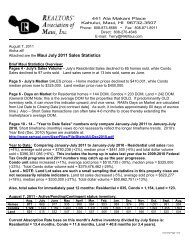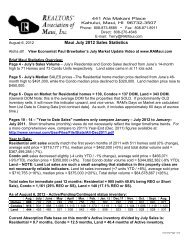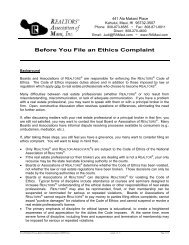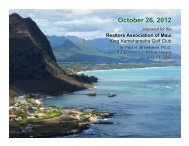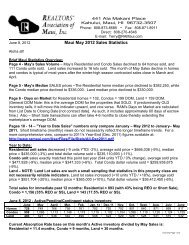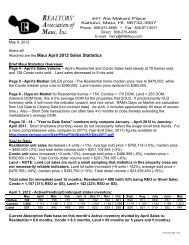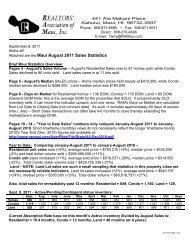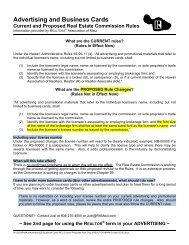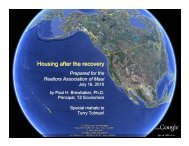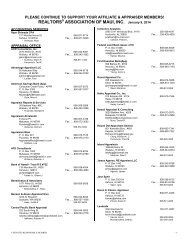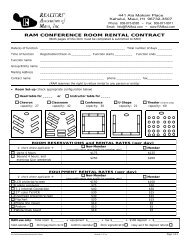ethics complaint process - REALTORS® Association of Maui, Inc.
ethics complaint process - REALTORS® Association of Maui, Inc.
ethics complaint process - REALTORS® Association of Maui, Inc.
You also want an ePaper? Increase the reach of your titles
YUMPU automatically turns print PDFs into web optimized ePapers that Google loves.
441 Ala Makani Place<br />
Kahului, <strong>Maui</strong>, HI 96732-3507<br />
Phone: 808-873-8585 ~ Fax: 808-871-8911<br />
Direct: 808-270-4600<br />
Email: Judi@RA<strong>Maui</strong>.com ~ www.RA<strong>Maui</strong>.com<br />
ETHICS COMPLAINT PROCESS<br />
(please read thoroughly)<br />
The guidelines in this document are from the Code <strong>of</strong> Ethics and Arbitration Manual <strong>of</strong> the National <strong>Association</strong> <strong>of</strong><br />
REALTORS ® and have been compiled to give the complainant an overview <strong>of</strong> the <strong>process</strong> when submitting an <strong>ethics</strong><br />
<strong>complaint</strong>. The Code <strong>of</strong> Ethics and Arbitration Manual contains complete information relevant to <strong>ethics</strong> <strong>complaint</strong><br />
procedures, and is available for your review or purchase at the <strong>of</strong>fice <strong>of</strong> the REALTORS ® <strong>Association</strong> <strong>of</strong> <strong>Maui</strong> (“RAM”) if<br />
you wish to review the <strong>process</strong> in greater detail.<br />
An <strong>ethics</strong> <strong>complaint</strong> may be filed when a member <strong>of</strong> the public or a member <strong>of</strong> the RAM (“complainant”) believes that a<br />
member <strong>of</strong> the RAM (“respondent”) has violated an Article or Articles <strong>of</strong> the Code <strong>of</strong> Ethics <strong>of</strong> the National <strong>Association</strong><br />
<strong>of</strong> REALTORS ® . An <strong>ethics</strong> <strong>complaint</strong> must be filed with the RAM within one hundred eighty (180) days <strong>of</strong> the time<br />
that the alleged <strong>of</strong>fense and facts relating to it could have been known by the complainant in the exercise <strong>of</strong><br />
reasonable diligence or within one hundred eighty (180) days after the conclusion <strong>of</strong> the transaction, whichever is<br />
later. (S.19).<br />
When an <strong>ethics</strong> <strong>complaint</strong> and an arbitration request are filed at the same time arising out <strong>of</strong> the same facts and<br />
circumstances, the arbitration hearing shall be held first and the <strong>ethics</strong> hearing shall be conducted by a different<br />
hearing panel after the conclusion <strong>of</strong> the arbitration hearing. (SoPSP.35)<br />
NOTE: Damages are never awarded to a complainant in an <strong>ethics</strong> <strong>complaint</strong>, nor are any other monetary awards<br />
(such as attorney fees, etc.).<br />
1. ETHICS COMPLAINT FORM. The complainant must complete a "RAM Ethics Complaint" form (refer to form for<br />
requirements and restrictions) and submit it to the Pr<strong>of</strong>essional Standards Administrator <strong>of</strong> the RAM. Complainant<br />
must include a typed statement that gives an overview <strong>of</strong> the situation in chronological order, indicating the nature<br />
<strong>of</strong> the controversy, and include one-sided copies <strong>of</strong> all pertinent, supporting documents. Complainant should be<br />
thorough – this is the opportunity for the complainant to state his or her case. (Complainant should retain a copy<br />
<strong>of</strong> all documents for reference.)<br />
The complainant must determine what Article was allegedly violated. If it is believed that more than one Article<br />
has been violated, each Article MUST BE addressed INDIVIDUALLY with specific reasons given for the alleged<br />
violation <strong>of</strong> each Article. If a member <strong>of</strong> the public is uncertain as to what Article(s) was violated, a Grievance<br />
Committee member can assist the complainant in preparing the <strong>complaint</strong> in proper form. However, the<br />
Grievance Committee member providing this procedural assistance does not become the complainant’s advocate<br />
and, further, should not participate in the Grievance Committee’s evaluation or determination <strong>of</strong> the <strong>complaint</strong>.<br />
(S.19a; App. V to Part Four.5)<br />
The REALTOR ® (principal) is not automatically joined as a respondent in an <strong>ethics</strong> <strong>complaint</strong> filed against another<br />
REALTOR ® (non-principal) licensed with the REALTOR ® (principal). The REALTOR ® (principal) may be joined as a<br />
respondent by action <strong>of</strong> the complainant, by review <strong>of</strong> the Grievance Committee, or by determination <strong>of</strong> the<br />
hearing panel prior to commencement <strong>of</strong> the hearing based upon the facts <strong>of</strong> the <strong>complaint</strong>. (S.13d)<br />
2. INITIAL REVIEW OF AN ETHICS COMPLAINT BY GRIEVANCE COMMITTEE CHAIRPERSON. Upon receipt <strong>of</strong><br />
an <strong>ethics</strong> <strong>complaint</strong>, the Grievance Committee Chairperson shall review the written <strong>complaint</strong> and any supporting<br />
documents submitted by the complainant. The Chairperson may assign one or more members <strong>of</strong> the Grievance<br />
Committee to review the <strong>complaint</strong> and to make any necessary evaluation.<br />
3. ETHICS COMPLAINT FORWARDED TO RESPONDENT. A copy <strong>of</strong> the <strong>ethics</strong> <strong>complaint</strong>, as submitted by the<br />
complainant, is forwarded to the respondent for informational purposes only. The <strong>Association</strong> neither requires nor<br />
accepts a response to the <strong>complaint</strong> from the respondent prior to review by the Grievance Committee.<br />
W:\JUDI\Ps&Arb\Process-Ethics CURRENT.doc current: 01-11 Page 1 <strong>of</strong> 8
4. GRIEVANCE COMMITTEE’S REVIEW OF AN ETHICS COMPLAINT. The Grievance Committee meets within<br />
approximately thirty (30) days following the initial review by the Grievance Committee Chairperson or assigned<br />
reviewer. The function <strong>of</strong> the Grievance Committee is to make only such preliminary review and evaluation <strong>of</strong> the<br />
<strong>complaint</strong> as are required to determine whether the <strong>complaint</strong> warrants further consideration by a hearing panel <strong>of</strong><br />
the Pr<strong>of</strong>essional Standards Committee. The Grievance Committee does not conduct hearings and does not<br />
determine if a violation <strong>of</strong> the Code <strong>of</strong> Ethics has occurred. The Grievance Committee makes its determination as<br />
to whether to: (1) dismiss the <strong>complaint</strong> as unworthy <strong>of</strong> further consideration; (2) refer it back to the complainant<br />
as appropriate for arbitration rather than disciplinary action; or, (3) refer it back to the Pr<strong>of</strong>essional Standards<br />
Administrator to schedule for a hearing before a hearing panel <strong>of</strong> the Pr<strong>of</strong>essional Standards Committee. (S.20a)<br />
In reviewing an <strong>ethics</strong> <strong>complaint</strong>, the Grievance Committee considers the following:<br />
a. Is the <strong>ethics</strong> <strong>complaint</strong> acceptable in form as received by the Committee? If not in proper form, the<br />
Chairperson may request that the Pr<strong>of</strong>essional Standards Administrator contact the complainant to advise that<br />
the <strong>complaint</strong> must be submitted in proper form.<br />
Note: If deemed appropriate by the Chairperson, a member <strong>of</strong> the Grievance Committee (or the Pr<strong>of</strong>essional<br />
Standards Administrator) may be assigned to contact the complainant and to provide procedural<br />
assistance to amend the <strong>complaint</strong> or resubmit a new <strong>complaint</strong> in proper form and with proper content.<br />
The Grievance Committee member providing such assistance shall ensure that only procedural<br />
assistance is provided to the complainant, and that the complainant understands that the member is not<br />
representing the complainant.<br />
b. Are all necessary parties named in the <strong>complaint</strong>?<br />
c. Was the <strong>complaint</strong> filed within one hundred eighty (180) days <strong>of</strong> the time that the alleged <strong>of</strong>fense and facts<br />
relating to it could have been known by the complainant in the exercise <strong>of</strong> reasonable diligence?<br />
d. Is the respondent named in the <strong>complaint</strong> a member <strong>of</strong> the <strong>Association</strong>, and was the respondent a member <strong>of</strong><br />
any <strong>Association</strong> at the time <strong>of</strong> the alleged <strong>of</strong>fense?<br />
e. Is litigation or any government agency investigation or other action pending related to the same transaction?<br />
(S.13e & S.19.B.5)<br />
• If criminal litigation is pending related to the same transaction, the Grievance Committee shall cease its<br />
considerations and instruct the Pr<strong>of</strong>essional Standards Administrator to hold the file pending until such<br />
time as the criminal litigation is concluded. A report shall be made to the <strong>Association</strong> President.<br />
• If civil litigation is pending related to the same transaction, the Grievance Committee shall instruct the<br />
Pr<strong>of</strong>essional Standards Administrator to have <strong>Association</strong> legal counsel review the <strong>complaint</strong> filed and<br />
advise if any hearing should proceed (presuming the matter would otherwise warrant a hearing). The<br />
<strong>complaint</strong> may, at the discretion <strong>of</strong> the Board <strong>of</strong> Directors, proceed to a hearing before a hearing panel <strong>of</strong><br />
the <strong>Association</strong>’s Pr<strong>of</strong>essional Standards Committee. <strong>Association</strong> legal counsel should be consulted and<br />
the following factors shall be taken into consideration in determining whether the matter should proceed to<br />
a hearing or should be held in abeyance pending the conclusion <strong>of</strong> civil litigation or a proceeding before<br />
the state real estate licensing authority or any other state or federal regulatory or administrative agency.<br />
Legal counsel shall consider the following:<br />
1) Similarity <strong>of</strong> factors giving rise to pending litigation or regulatory or administrative proceeding and the<br />
<strong>ethics</strong> <strong>complaint</strong>;<br />
2) Degree to which resolution <strong>of</strong> the pending civil litigation or regulatory or administrative proceeding<br />
could make consideration <strong>of</strong> the <strong>ethics</strong> <strong>complaint</strong> unnecessary;<br />
3) Degree to which pending litigation or regulatory or administrative proceeding would delay prompt<br />
disposition <strong>of</strong> the <strong>ethics</strong> <strong>complaint</strong>;<br />
4) The nature <strong>of</strong> the alleged violation and the extent to which it could impact on cooperation with other<br />
<strong>Association</strong> Members;<br />
5) The assurance <strong>of</strong> <strong>Association</strong> legal counsel that consideration <strong>of</strong> an <strong>ethics</strong> <strong>complaint</strong> would not<br />
deprive the respondent <strong>of</strong> due <strong>process</strong>.<br />
f. Is there any reason to conclude that the <strong>Association</strong> would be unable to provide an impartial hearing panel?<br />
W:\JUDI\Ps&Arb\Process-Ethics CURRENT.doc current: 01-11 Page 2 <strong>of</strong> 8
g. Are the specific Articles cited in the <strong>complaint</strong> appropriate in light <strong>of</strong> the facts provided? Should additional<br />
Articles be cited? Should certain Standards <strong>of</strong> Practice be cited in support <strong>of</strong> the Articles charged? Are any<br />
inappropriate Articles cited?<br />
h. If the facts alleged in the <strong>complaint</strong> were taken as true on their face, is it possible that a violation <strong>of</strong> the Code<br />
<strong>of</strong> Ethics occurred?<br />
5. ETHICS COMPLAINT REFERRED TO HEARING. If all relevant questions have been answered to the<br />
satisfaction <strong>of</strong> the Grievance Committee, and the facts given appear to indicate a possible violation <strong>of</strong> the Code <strong>of</strong><br />
Ethics, the Grievance Committee shall refer the <strong>complaint</strong> to the Pr<strong>of</strong>essional Standards Committee for a hearing<br />
by an <strong>ethics</strong> hearing panel. (S.19.B) Notification <strong>of</strong> the Grievance Committee’s findings will be forwarded to the<br />
complainant and the respondent within approximately two (2) weeks <strong>of</strong> the Grievance Committee meeting.<br />
Note: The Grievance Committee should use all reasonable efforts to ensure that all <strong>ethics</strong> <strong>complaint</strong>s arising out<br />
<strong>of</strong> the same transaction or event are consolidated and scheduled for hearing in a single hearing.<br />
Respondents to <strong>ethics</strong> <strong>complaint</strong>s do not have the right to a separate hearing unless they can demonstrate<br />
that consolidation <strong>of</strong> <strong>complaint</strong>s would prevent them from receiving a fair hearing. (SoPSP.34)<br />
6. RESPONSE IS REQUIRED. If the Grievance Committee finds the matter properly subject to an <strong>ethics</strong> hearing,<br />
the Respondent will be required to complete a Response to Pr<strong>of</strong>essional Standards Committee form and return<br />
the written response and all supporting documents to the <strong>Association</strong> within fifteen (15) days from the date <strong>of</strong><br />
mailing to respondent. Failure to respond may subject the respondent to a charge <strong>of</strong> having violated Article 14 for<br />
failing to submit pertinent facts to an appropriate tribunal. (S.19.B.8 & 20a) The respondent should be thorough –<br />
this is the respondent’s opportunity to state his or her case.<br />
7. RESPONSE TO COMPLAINANT. A copy <strong>of</strong> the response and supporting documents will be mailed to the<br />
complainant within two (2) weeks <strong>of</strong> receipt by the <strong>Association</strong>.<br />
8. IF RESPONDENT IS INVOLVED IN PENDING LITIGATION OR OTHER COMPLAINT PROCEEDING. In the<br />
event the respondent named in any <strong>complaint</strong> alleging a violation <strong>of</strong> the Code <strong>of</strong> Ethics is involved in any criminal<br />
or civil litigation or in any government agency investigation or other action pending arising out <strong>of</strong> the same facts<br />
and circumstances giving rise to the <strong>complaint</strong> alleging unethical conduct, the procedures outlined in #4.e above<br />
will be followed prior to any further action being taken.<br />
9. DISMISSAL OF COMPLAINT, DELETION OR ADDITION OF ARTICLE(S), INAPPROPRIATE ARTICLE(S)<br />
CITED, AMENDMENT OF COMPLAINT.<br />
Any action by the Grievance Committee dismissing the <strong>complaint</strong> as unworthy <strong>of</strong> further consideration may be<br />
appealed by the complainant to the Board <strong>of</strong> Directors within twenty (20) days from receipt <strong>of</strong> dismissal notice.<br />
(S.20c)<br />
If the <strong>complaint</strong> asserts multiple allegations <strong>of</strong> unethical conduct and the Grievance Committee determines that<br />
one or more <strong>of</strong> the allegations would not, under any circumstances, constitute a violation, that portion <strong>of</strong> the<br />
<strong>complaint</strong> may be dismissed while the balance <strong>of</strong> the <strong>complaint</strong> is forwarded for a hearing before a hearing panel<br />
<strong>of</strong> the Pr<strong>of</strong>essional Standards Committee. However, the complainant has the right to appeal the dismissal to the<br />
Board <strong>of</strong> Directors.<br />
If the Grievance Committee dismisses the <strong>complaint</strong>, the notice <strong>of</strong> dismissal shall specify the reasons for<br />
dismissing and the complainant may appeal the dismissal to the Board <strong>of</strong> Directors within twenty (20) days from<br />
receipt <strong>of</strong> the dismissal notice using Form #E-22, Appeal <strong>of</strong> Grievance Committee Dismissal <strong>of</strong> Ethics Complaint.<br />
The <strong>complaint</strong> and any attachments to the <strong>complaint</strong> cannot be revised, modified, or supplemented. The<br />
complainant may, however, explain in writing why the complainant disagrees with the Grievance Committee’s<br />
conclusion that the <strong>complaint</strong> should be dismissed. If the Grievance Committee deletes an Article or Articles from<br />
an <strong>ethics</strong> <strong>complaint</strong>, the complainant may also appeal to the Board <strong>of</strong> Directors using Form #E-22, Appeal <strong>of</strong><br />
Grievance Committee Dismissal <strong>of</strong> Ethics Complaint. The Directors (or a panel <strong>of</strong> Directors or the Executive<br />
Committee) shall consider only the information and documents considered by the Grievance Committee, together<br />
with the complainant’s rationale for challenging the dismissal and render its decision, which shall be final. The<br />
parties are not present at the meeting at which the appeal is considered.<br />
W:\JUDI\Ps&Arb\Process-Ethics CURRENT.doc current: 01-11 Page 3 <strong>of</strong> 8
If the Grievance Committee believes that the respondent’s alleged conduct may be the basis for a violation but<br />
that an inappropriate Article(s) has been cited, the Grievance Committee may amend the <strong>complaint</strong> by deleting<br />
any inappropriate Article(s) and/or by adding any appropriate Article(s) and/or respondent(s) to the <strong>complaint</strong>. If<br />
the complainant disagrees with the deletion <strong>of</strong> an Article(s) from the <strong>complaint</strong>, the complainant may appeal to the<br />
Board <strong>of</strong> Directors requesting that the original <strong>complaint</strong> be forwarded to a hearing panel as filed. If the Grievance<br />
Committee determines that an Article(s) or an additional respondent(s) should be added to the <strong>complaint</strong> and the<br />
complainant will not agree to the addition, the Grievance Committee may file its own <strong>complaint</strong> and both<br />
<strong>complaint</strong>s will be heard simultaneously by the same hearing panel. (S.20d)<br />
10. ETHICS HEARING IS SCHEDULED. If the Grievance Committee refers the <strong>ethics</strong> <strong>complaint</strong> to a Pr<strong>of</strong>essional<br />
Standards hearing, the complainant and respondent will appear before a hearing panel <strong>of</strong> the RAM. The date for<br />
hearing will be set and all parties will be notified <strong>of</strong> the date and place <strong>of</strong> hearing at least twenty-one (21) days in<br />
advance <strong>of</strong> the scheduled hearing date. (S.7)<br />
11. CONFIDENTIALITY. The parties are reminded that they shall not discuss the case with any member <strong>of</strong> a hearing<br />
panel or the Board <strong>of</strong> Directors <strong>of</strong> the RAM prior to the hearing or after the hearing and prior to or after the<br />
announcement <strong>of</strong> the decision. The allegations, findings, and decisions rendered in <strong>ethics</strong> and arbitration hearings<br />
are confidential and should not be reported or published by the <strong>Association</strong>, any member <strong>of</strong> a tribunal, or any party<br />
under any circumstances except those established in the Code <strong>of</strong> Ethics and Arbitration Manual <strong>of</strong> the National<br />
<strong>Association</strong> as from time-to-time amended. (S<strong>of</strong>PSP.19)<br />
Pursuant to Article 14, Standard <strong>of</strong> Practice 14-2, “REALTORS ® shall not make any unauthorized disclosure or<br />
dissemination <strong>of</strong> the allegations, findings, or decision developed in connection with an <strong>ethics</strong> hearing or appeal or<br />
in connection with an arbitration hearing or procedural review.<br />
12. SELECTION OF HEARING PANEL. The hearing panel consists <strong>of</strong> at least three (3), and not more than five (5),<br />
panel members <strong>of</strong> the Pr<strong>of</strong>essional Standards and Arbitration Committee, and may have one (1) alternate panel<br />
member. The parties will receive a list <strong>of</strong> the potential panel members prior to the hearing and have the right to<br />
challenge any <strong>of</strong> the individuals. No more than one person licensed with any firm, partnership, or corporation may<br />
serve on the same tribunal. A person shall automatically be disqualified as a member <strong>of</strong> a tribunal (hearing panel<br />
or Board <strong>of</strong> Directors) in any <strong>ethics</strong> case in which the person is:<br />
a. related by blood or marriage to either complainant, respondent, or a REALTOR ® acting as a counsel for either<br />
the complainant or respondent;<br />
b. is an employer, partner, or employee, or in any way associated in business with either complainant,<br />
respondent, or a REALTOR ® acting as counsel for the complainant or respondent;<br />
c. a party to the hearing, or a party or witness in any pending case involving a party to the hearing;<br />
d. objected to by a party due to factors that would prevent a tribunal member from rendering an impartial,<br />
unbiased and knowledgeable decision. If the reason is deemed sufficient to support your challenge, the<br />
individual challenged will not be appointed to the panel. (S.2b/f)<br />
13. COMPLAINT WITHDRAWN.<br />
Complainant may withdraw their <strong>complaint</strong> at any time prior to the start <strong>of</strong> an <strong>ethics</strong> hearing. If a <strong>complaint</strong> is<br />
withdrawn by the complainant after the Grievance Committee determines the <strong>complaint</strong> requires a hearing, it will<br />
be referred back to the Grievance Committee to determine whether a potential violation <strong>of</strong> the public trust (as<br />
defined in Article IV, Section 2 <strong>of</strong> the National <strong>Association</strong>'s Bylaws) may have occurred. Only where the<br />
Grievance Committee determines a potential violation <strong>of</strong> the public trust may have occurred may the Grievance<br />
Committee proceed as the complainant. A <strong>complaint</strong> so withdrawn shall not be deemed a final determination on<br />
the merits. (S.21e)<br />
14. COMPLAINT AMENDED PRIOR TO HEARING. At any time prior to the hearing <strong>of</strong> the <strong>complaint</strong>, the complainant<br />
may file an amended <strong>complaint</strong> with the Pr<strong>of</strong>essional Standards Administrator. If an amended <strong>complaint</strong> is filed<br />
prior to the hearing, the respondent shall be notified, given a copy, and provided the opportunity to file an<br />
amended response. The hearing panel may disallow the amended <strong>complaint</strong>, in which case the matter shall be<br />
continued to a new date for hearing on the original <strong>complaint</strong>. (S.21-f.1)<br />
W:\JUDI\Ps&Arb\Process-Ethics CURRENT.doc current: 01-11 Page 4 <strong>of</strong> 8
15. COMPLAINT AMENDED DURING THE HEARING. At any time during the hearing, the <strong>complaint</strong> may be<br />
amended either by the complainant or upon motion <strong>of</strong> the hearing panel. In such event, the hearing, with the<br />
concurrence <strong>of</strong> the respondent, may proceed uninterrupted or be reconvened on a date not less than fifteen (15)<br />
days or more than thirty (30) days from adjournment. If the respondent knowingly waives his or her right to the<br />
adjournment, the record should reflect the fact that the respondent was aware <strong>of</strong> the right to an adjournment but<br />
chose to proceed. (S.21-f.2)<br />
16. COMPLAINANT UNABLE TO ATTEND HEARING. In the event that the <strong>complaint</strong> scheduled for a hearing is from<br />
a member <strong>of</strong> the public who refuses, or is unable, to attend the hearing, the <strong>complaint</strong> shall be referred back to the<br />
Grievance Committee. If the Grievance Committee determines that there is sufficient information for a hearing<br />
panel to consider (i.e., that there is clear, strong, and convincing pro<strong>of</strong>), the <strong>complaint</strong> shall be amended to name<br />
the Grievance Committee as complainant and the hearing shall be continued to a new date. The respondent shall<br />
be provided with a copy <strong>of</strong> the amended <strong>complaint</strong> in such cases. (S.21-f.3)<br />
17. RESPONDENT’S FAILURE TO ATTEND HEARING. In the event that the respondent fails to appear at a duly<br />
noticed hearing without first obtaining a continuance or adjournment, the hearing panel may proceed with the<br />
hearing in the respondent's absence and shall reach its decision based on the evidence made available at the<br />
hearing. (S.21g)<br />
18. RIGHT OF COUNSEL TO APPEAR. Every party may be represented by legal counsel or by a REALTOR ® <strong>of</strong> their<br />
choosing (or both). The role <strong>of</strong> counsel (whether legal or REALTOR ® ) includes the making <strong>of</strong> opening and closing<br />
statements on behalf <strong>of</strong> the party represented, examining and cross-examining witnesses, and introducing<br />
affidavits, documents, and other admissible relevant evidence, but does not include testifying as a witness unless<br />
the panel determines such testimony is essential to ensure due <strong>process</strong>. REALTORS ® providing such<br />
representation are cautioned to avoid the unauthorized practice <strong>of</strong> law. The <strong>Association</strong> and all other parties must<br />
be given at least fifteen (15) days notice prior to the hearing. In the event parties do not provide this information<br />
within the time specified, the panel shall take all steps, including continuance <strong>of</strong> the matter, if necessary, to<br />
guarantee the rights <strong>of</strong> all parties to representation by counsel. (S.4) Each party is responsible for the expenses<br />
<strong>of</strong> his or her respective counsel. (S.21h)<br />
19. WITNESSES. Every party may have witnesses present at the hearing, and the tribunal may summon its own<br />
witnesses. All witnesses will be excused from the hearing after completion <strong>of</strong> their testimony and crossexamination.<br />
Any party who intends to call witnesses at the hearing must provide the <strong>Association</strong> and all other<br />
parties with the names <strong>of</strong> these witnesses at least fifteen (15) days prior to the hearing. Failure to provide this<br />
information within the time specified will constitute a waiver <strong>of</strong> the right to call those witnesses at the hearing,<br />
unless the other party agrees to allow their testimony. In any case where all <strong>of</strong> the names <strong>of</strong> witnesses a party<br />
intends to call at the hearing have not been provided within the time specified, if the hearing panel believes that<br />
the testimony <strong>of</strong> that witness(es) is essential to ensure due <strong>process</strong>, their testimony may be permitted provided the<br />
other party has the right to request that the hearing be recessed and continued to a date certain, not less than five<br />
(5) business days later. (S.5) Each party is responsible for the expenses <strong>of</strong> expert witnesses he or she calls.<br />
(S.21h)<br />
20. HEARING PROCEDURES. At the hearing, every party has the right to present any witnesses, to submit any<br />
evidence pertinent to the case, and to cross-examine witnesses. Every party will be given ample opportunity to<br />
state their case, uninterrupted. Each party will have an opportunity to question the other party, and may present a<br />
closing statement. The hearing panel has the right to interrupt at any time to clarify a point <strong>of</strong> a party. Before<br />
permitting testimony relating to the character or general reputation <strong>of</strong> anyone, the hearing panel shall satisfy itself<br />
that the testimony has a direct bearing on the case at issue. Attorneys may speak on behalf <strong>of</strong> a party, but the<br />
panel still has the right to question a party directly. If your case is referred to a hearing, you will receive written,<br />
detailed procedures that are followed during the hearing.<br />
Upon notice by the Pr<strong>of</strong>essional Standards Administrator, the parties shall, with diligence, present to the panelists<br />
in writing such statements and pro<strong>of</strong> which they deem necessary to support their positions. Pro<strong>of</strong> may be<br />
submitted in the form <strong>of</strong> affidavits or otherwise. The hearing panel may require that statements be verified by<br />
affidavits or that accuracy or authenticity <strong>of</strong> any documents or other papers submitted be verified by affidavit. At<br />
the hearing, the panelists shall receive any further written statements, documents, or other papers, shall hear oral<br />
testimony and determine what personal appearances shall be made by the parties, and shall regulate the holding<br />
<strong>of</strong> hearings. The hearing panel may receive and consider any evidence they deem material and proper, including<br />
evidence <strong>of</strong> experts (parties should be aware that evidence submitted at a hearing may not be accepted into<br />
evidence by the hearing panel). (S.21.h) It is highly recommended that all documents be presented prior to the<br />
hearing so that all parties have the time to review said documents.<br />
W:\JUDI\Ps&Arb\Process-Ethics CURRENT.doc current: 01-11 Page 5 <strong>of</strong> 8
21. TRANSMITTING DEVICES. Cellular phones, two-way radios and other transmitting devices may not be operated<br />
during <strong>ethics</strong> hearings, arbitration hearings, appeal hearings, and procedural review hearings absent specific,<br />
advance authorization from the panel chair. (S<strong>of</strong>PSP.55)<br />
22. "REMOTE" TESTIMONY. The policies and procedures established in the National <strong>Association</strong>'s Code <strong>of</strong> Ethics<br />
and Arbitration Manual contemplate that except in extreme circumstances parties and their witnesses will<br />
participate in <strong>ethics</strong> and arbitration hearings in the physical presence <strong>of</strong> hearing panels and the respective parties.<br />
"Extreme circumstances" in which parties and witnesses to <strong>ethics</strong> and arbitration hearings may be permitted to<br />
participate in those hearings by teleconference or videoconference at the discretion <strong>of</strong> the hearing panel chair are<br />
defined as circumstances where (1) postponement or rescheduling <strong>of</strong> the hearing to permit their participation is not<br />
feasible and (2) failure to accept such testimony or permit such participation would deny a party a fair hearing.<br />
The costs <strong>of</strong> "remote" testimony shall be the responsibility <strong>of</strong> the party requesting the opportunity to participate or<br />
<strong>of</strong>fer testimony by teleconference or videoconference.<br />
Counsel is permitted to participate in <strong>ethics</strong> or arbitration hearings only in the physical presence <strong>of</strong> hearing panels.<br />
(S<strong>of</strong>PSP.56)<br />
23. BURDENS AND STANDARDS OF PROOF IN ETHICS HEARING. In any <strong>ethics</strong> hearing or other hearing<br />
convened to consider alleged violations <strong>of</strong> membership duties, the ultimate burden <strong>of</strong> proving that the Code <strong>of</strong><br />
Ethics or other membership duty has been violated, is at all times on complainants.<br />
"Clear, strong, and convincing" shall be the standard <strong>of</strong> pro<strong>of</strong> by which alleged violations <strong>of</strong> all membership duties,<br />
including violations <strong>of</strong> the Code <strong>of</strong> Ethics, are determined. Clear, strong, and convincing shall be defined as that<br />
measure or degree <strong>of</strong> pro<strong>of</strong> which will produce a firm belief or conviction as to the allegations sought to be<br />
established. (S<strong>of</strong>PSP.26)<br />
24. RECORDING THE HEARING. All hearings are recorded by the RAM; and are considered the <strong>of</strong>ficial record <strong>of</strong> the<br />
proceeding; however, recordings may not be used by either party for anything other than an appeal or rehearing<br />
(<strong>Association</strong>s shall prohibit parties from recording appeals or limited procedural review proceedings). Any party to<br />
a hearing has the right to obtain a copy <strong>of</strong> the <strong>Association</strong>’s <strong>of</strong>ficial tape recording (prior to the appeal deadline)<br />
subject to payment <strong>of</strong> the <strong>Association</strong>’s duplication costs, and any duplication will be conducted under the<br />
supervision <strong>of</strong> the <strong>Association</strong>. A party may record the hearing; but if transcribed, a copy must be given to RAM<br />
(the proceedings will not be interrupted in the event a party has any recording difficulties). All documents<br />
pertaining to the case, as well as any recordings, are destroyed after the Board <strong>of</strong> Directors affirms the decision <strong>of</strong><br />
the hearing panel. (S.6)<br />
25. DECISION OF THE HEARING PANEL. The decision <strong>of</strong> the hearing panel shall be by a simple majority vote and<br />
in writing. Under no circumstances can the <strong>Association</strong> award money “damages” in an <strong>ethics</strong> proceeding. The<br />
decision shall be filed with the Pr<strong>of</strong>essional Standards Administrator within ten (10) days after the hearing panel’s<br />
decision is final. The hearing panel’s decision shall be considered final only when it is in writing and signed by<br />
members <strong>of</strong> the panel following their personal review and review by legal counsel. The Pr<strong>of</strong>essional Standards<br />
Administrator shall transmit a copy <strong>of</strong> the decision to the complainant and respondent within five (5) business days<br />
after receiving the hearing panel’s decision in writing, except that reasonable delay shall not invalidate the<br />
<strong>Association</strong>’s procedures nor the decision. In the event the respondent is found in violation, the hearing panel<br />
may, at its discretion, consider all records <strong>of</strong> previous violations and sanctions imposed. (S.22.a,b)<br />
If a party is found in violation <strong>of</strong> the Code <strong>of</strong> Ethics, the panel may impose only one or more <strong>of</strong> the following<br />
disciplinary actions:<br />
a. Letter <strong>of</strong> Warning with copy to be placed in member’s file;<br />
b. Letter <strong>of</strong> Reprimand with copy to be placed in member’s file;<br />
c. Requirement that member attend the <strong>ethics</strong> portion <strong>of</strong> the <strong>Association</strong> Indoctrination Course or other<br />
appropriate course or seminar specified by the hearing panel which the respondent could reasonably attend<br />
taking into consideration cost, location, and duration;<br />
W:\JUDI\Ps&Arb\Process-Ethics CURRENT.doc current: 01-11 Page 6 <strong>of</strong> 8
d. Appropriate and reasonable fine not to exceed $5,000;<br />
The following guidelines may be used:<br />
$ 200 – 1 violation.<br />
$ 500 – 2 violations.<br />
$1,000 – 3+ violations.<br />
$1,500 – second <strong>of</strong>fense, not necessarily the same Article(s).<br />
$2,500 – blatant violation or second <strong>of</strong>fense.<br />
e. Member placed on probation for a stated period <strong>of</strong> time not less than thirty (30) days nor more than one (1)<br />
year;<br />
f. Membership <strong>of</strong> individual suspended for a stated period not less than thirty (30) days nor more than one (1)<br />
year, with automatic reinstatement <strong>of</strong> membership in good standing at the end <strong>of</strong> the specified period <strong>of</strong><br />
suspension (decision should be written clearly articulating all intended consequences, including denial <strong>of</strong> MLS<br />
participatory or access privileges). The Directors may order suspension unconditionally, or they may, at their<br />
discretion, give the disciplined member the option <strong>of</strong> paying to the <strong>Association</strong>, within such time as the<br />
Directors shall designate, an assessment in an amount fixed by the Directors, which may not exceed $2,500<br />
and which can be utilized only once in any three (3) year period, in lieu <strong>of</strong> accepting suspension. But, if the<br />
conduct for which suspension is ordered consists <strong>of</strong> failure to submit a dispute to arbitration, the Directors may<br />
not permit the disciplined member to avoid suspension without submitting to the arbitration in addition to<br />
paying the assessment, unless in the meanwhile the dispute has been submitted to a court <strong>of</strong> law without any<br />
objection by any party that it should be arbitrated; * **<br />
* $5,000 is the maximum fine that may be assessed regardless <strong>of</strong> the number <strong>of</strong> Articles <strong>of</strong> the Code <strong>of</strong><br />
Ethics that a member is determined to have violated in any given hearing. It is noted that a “reasonable<br />
and appropriate” fine may vary from $1 to $5,000 and should relate to the gravity <strong>of</strong> the <strong>of</strong>fense and<br />
objective <strong>of</strong> the proposed sanction.<br />
g. Expulsion <strong>of</strong> individual from membership with no reinstatement privilege for a specified period <strong>of</strong> one (1) to<br />
three (3) years, with reinstatement <strong>of</strong> membership to be by application only after the specified period <strong>of</strong><br />
expulsion, on the merits <strong>of</strong> the application at the time received;<br />
h. Suspension or termination <strong>of</strong> MLS rights and privileges may also be utilized. Suspension <strong>of</strong> MLS services<br />
may be no less than thirty (30) days nor more than one (1) year; termination <strong>of</strong> MLS services shall be for a<br />
stated period <strong>of</strong> one (1) to three (3) years;<br />
i. REALTORS ® who participate in MLS or otherwise access MLS information through any Board or <strong>Association</strong> in<br />
which they do not hold membership are subject to the Code <strong>of</strong> Ethics in that Board or <strong>Association</strong> on the same<br />
terms and conditions as <strong>Association</strong> members. Discipline that may be imposed may be the same as but shall<br />
not exceed the discipline that may be imposed on members. <strong>Association</strong>s entering into regional or reciprocal<br />
MLS agreements are encouraged to include provisions requiring signatory <strong>Association</strong>s to respect, to the<br />
extent feasible, decisions rendered by other <strong>Association</strong>s involving suspension or expulsion from membership<br />
or from MLS.<br />
26. ADMINISTRATIVE PROCESSING FEE. In addition to any discipline imposed, an administrative <strong>process</strong>ing fee <strong>of</strong><br />
$250 will be assessed against respondents found in violation <strong>of</strong> the Code <strong>of</strong> Ethics or other membership duties<br />
which may be in addition to, and not part <strong>of</strong>, any sanction that may be imposed. (S.14)<br />
NOTE: Damages are never awarded to a complainant in an <strong>ethics</strong> <strong>complaint</strong>, nor are any other monetary awards<br />
(such as attorney fees, etc.).<br />
27. RIGHT TO A REHEARING. Within twenty (20) days after the hearing panel’s decision has been transmitted to the<br />
respondent and the complainant, the complainant or the respondent may petition the hearing panel for a<br />
rehearing, solely on the grounds <strong>of</strong> newly discovered material evidence which the petitioner could not, with<br />
reasonable diligence, have discovered and produced at the original hearing. The petition must be in writing.<br />
(S.22c) (The party to the hearing requesting a rehearing must contact the RAM Pr<strong>of</strong>essional Standards<br />
Administrator for guidelines to be followed.)<br />
W:\JUDI\Ps&Arb\Process-Ethics CURRENT.doc current: 01-11 Page 7 <strong>of</strong> 8
A petition not granted within two (2) weeks is considered automatically denied. No more than one (1) petition for<br />
rehearing may be filed in the case by each party. (S.22d)<br />
28. FILING AN APPEAL. Within twenty (20) days after the hearing panel’s final decision has been rendered if no<br />
petition has been filed, or within ten (10) days after denial <strong>of</strong> a petition for rehearing, the complainant or<br />
respondent may file an appeal with the President for a hearing before the Directors (or a panel there<strong>of</strong>). The<br />
complainant may appeal based only on alleged procedural deficiencies or other lack <strong>of</strong> procedural due <strong>process</strong><br />
that may have deprived the complainant <strong>of</strong> the opportunity for a full and fair hearing. The respondent may appeal<br />
the decision and/or recommendation for discipline on the basis <strong>of</strong> 1) misapplication or misinterpretation <strong>of</strong> an<br />
Article(s) <strong>of</strong> the Code <strong>of</strong> Ethics <strong>of</strong> the National <strong>Association</strong> <strong>of</strong> REALTORS ® , 2) procedural deficiency or any lack <strong>of</strong><br />
procedural due <strong>process</strong>, or 3) the discipline recommended by the hearing panel. (S.23 & S<strong>of</strong>PSP.26 & form E13)<br />
All appeals must be in writing and must be accompanied by a deposit <strong>of</strong> $250. The appeal should clearly indicate<br />
the bases on which the hearing panel's decision and/or recommendation for discipline is being challenged.<br />
(S.23c) (The party requesting an appeal must contact the RAM Pr<strong>of</strong>essional Standards Administrator for<br />
guidelines to be followed.)<br />
These guidelines are to assist you in understanding the <strong>process</strong> that is followed by the REALTORS ® <strong>Association</strong> <strong>of</strong> <strong>Maui</strong><br />
when an <strong>ethics</strong> <strong>complaint</strong> is filed. If you have any questions, please call the Pr<strong>of</strong>essional Standards Administrator at<br />
808-270-4600. (This synopsis is consistent with the policies <strong>of</strong> the National <strong>Association</strong> <strong>of</strong> REALTORS ® )<br />
W:\JUDI\Ps&Arb\Process-Ethics CURRENT.doc current: 01-11 Page 8 <strong>of</strong> 8



